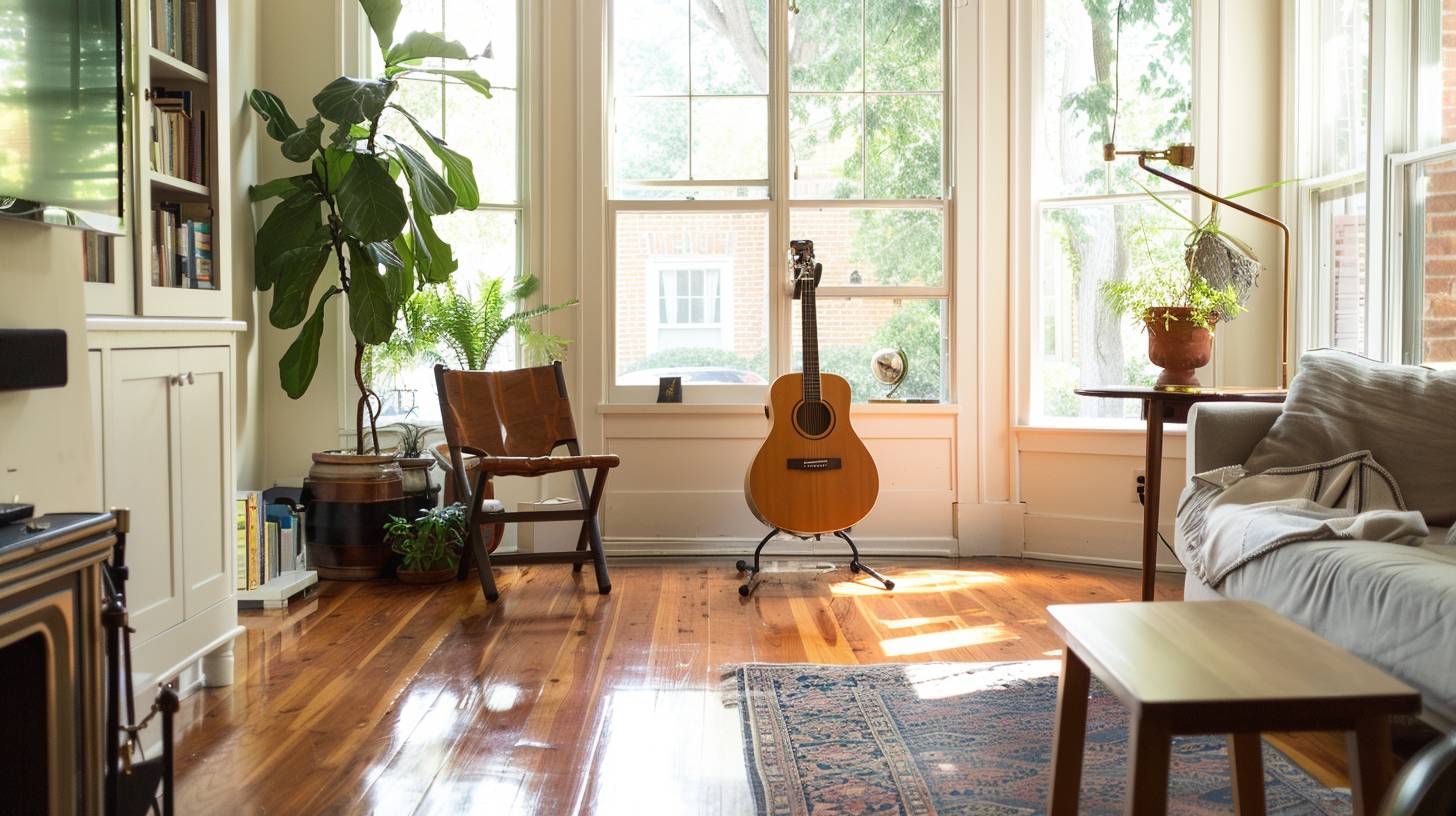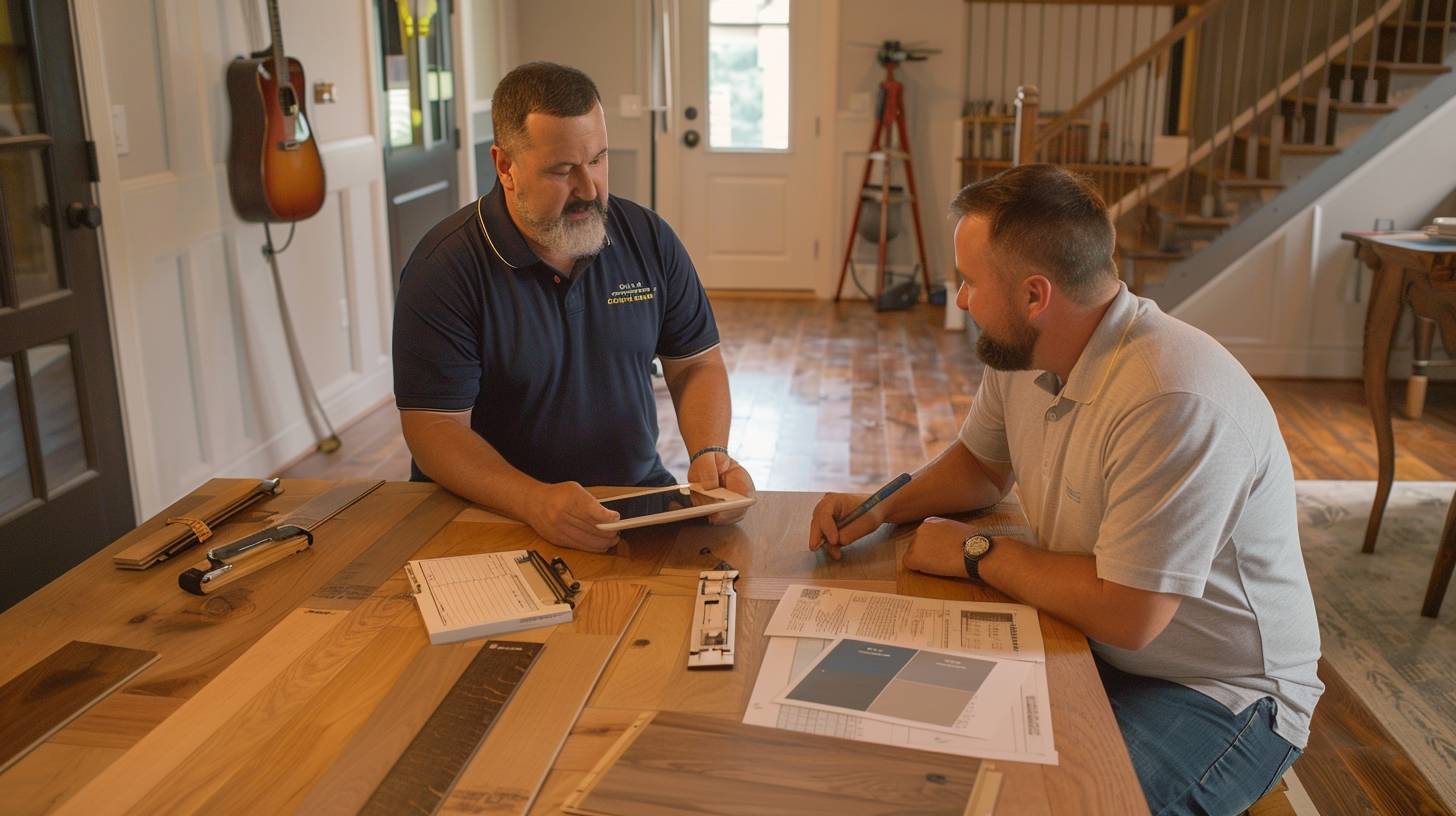Table of Contents [hide]
Hiring flooring contractors in Nashville shouldn’t feel like a gamble. Our heat, sudden storms, and mixed construction, such as the condos downtown, bungalows in East Nashville, and basements in Brentwood, mean your floors need the right prep and materials to stay quiet, flat, and beautiful.
This guide gives you the 10 must-ask questions, what good answers sound like, and simple red flags to avoid. Use it to compare bids, confirm licenses, and lock in a clean, on-time install you’ll love.
1. Are You Licensed and Insured in Tennessee?
Start by asking for credentials, then verify each item.
- Active Tennessee License: Confirms legal authority to perform flooring service and pull permits when needed. Verify their license at the Tennessee Department of Commerce and Insurance website.
- General Liability Insurance: Protects your home if something is damaged during the project.
- Workers’ Compensation: Ensure they have the Tennessee Bureau of Workers’ Compensation coverage. This covers employee injuries so you are not exposed.
- Local Business Details: A physical address in or near Nashville, TN signals accountability and quick support.
2. Can You Share Recent Local References?
Request at least three jobs completed in the last 6 to 12 months in areas like Green Hills, Sylvan Park, Franklin, or Mt. Juliet. Ask for addresses, contact info, and photos. You are looking for variety, like stairs, basements, and open-plan installs, to gauge depth of experience and consistency of finish quality. It’s also best to check BBB flooring contractors near Nashville for accreditation, complaint history, and recent reviews.
3. How Will You Handle Nashville’s Climate and Moisture?
Have them explain moisture testing, acclimation time, and installation techniques for seasonal humidity and flash-rain events. Good answers include vapor barriers over concrete, dehumidifier use during finishing, and expansion gaps sized for summer swings. Ask how they’ll respond if pre-install moisture readings fail spec and whether they can delay or add mitigation. For baseline planning, review Nashville climate normals (NOAA) to set acclimation and dehumidification targets.
4. What Subfloor Prep Is Included?
Subfloor work decides how quiet, flat, and stable your floor feels for years. Get these items in writing:
- Flatness targets and leveling: Specify the flatness standard (e.g., 1/8" over 6') and whether they’ll use self-leveling compounds or planing to meet spec.
- Structural fixes: Note squeak repairs, re-nailing or screw upgrades, and sistering joists or adding blocking where needed.
- Transitions and thresholds: Detail how they’ll finish at tile, carpet, stairs, and exterior doors to avoid trip edges and lift.
- Trim and finish work: Clarify who installs quarter round or shoe molding, handles paint touch-ups, and seals clean caulk lines.
5. Which Materials Do You Recommend and Why?
Ask for fit by room, care needs, and total cost. Here are Nashville-friendly picks with quick pros, watch-outs, and ballpark installed prices:
Hardwood Flooring
In Nashville’s older homes, think 12 South, East Nashville, Sylvan Park, hardwood matches historic trim and adds resale value. Our humidity swings mean proper acclimation and moisture control are a must, especially over crawlspaces and near exterior doors used during stormy summers.
- Best for: Living areas, halls, primary bedrooms
- Pros: Timeless, refinishable, boosts resale
Watch-outs: Sensitive to pets/heels; needs acclimation & moisture control - Typical installed cost:$10–$18/sq ft (refinishing $4–$7/sq ft)
Engineered Wood
For slab-on-grade homes in Bellevue, Antioch, and parts of Brentwood, engineered wood handles HVAC swings and allows wide planks without cupping. It’s also condo-friendly when paired with an HOA-approved sound underlayment.
- Best for: Over concrete slabs; wide-plank looks
- Pros: More stable than solid; factory finishes; good for seasonal swings
- Watch-outs: Limited sand-and-refinish life; verify slab moisture
- Typical installed cost:$9–$16/sq ft
Vinyl Flooring (LVP/LVT)
Busy households near parks or greenways drag in grit and rain; LVP/LVT shines in Green Hills mudrooms, Donelson basements, and rental units around Midtown. With the right pad, it stays quiet in the upstairs rooms of townhomes.
- Best for: Kitchens, basements, entries, rentals
- Pros: Waterproof, durable, easy care; sound control with good underlayment
- Watch-outs: Cheap cores telegraph subfloor flaws; watch UV fade at sunny sliders
- Typical installed cost:$5–$9/sq ft (premium $8–$12/sq ft)
Tile Flooring (Ceramic or Porcelain)
Tile is a workhorse in West Meade laundries, Hillsboro baths, and East Nashville entries where winter salt and summer storms meet. Nashville’s older subfloors often need flattening so large-format tile sits tight and grout stays clean.
- Best for: Baths, laundry, mudrooms, high-traffic entries
- Pros: Handles water/salt, long lifespan, huge style range
- Watch-outs: Requires very flat substrate & movement joints; grout care matters
- Typical installed cost:$12–$25/sq ft
Laminate Flooring
Great for budget updates in guest rooms or bonus spaces from Hermitage to Madison. Modern laminates resist scratches from pets but still prefer dry rooms and quick spill cleanup.
- Best for: Budget-friendly refreshes; upper floors
- Pros: Strong scratch resistance; quick installs
- Watch-outs: Not truly waterproof unless rated; edges can swell if soaked
- Typical installed cost:$4–$8/sq ft
Carpet Flooring
Warm and quiet in Belle Meade bedrooms or home theaters in Nolensville. Choose pads that tame sound in two-story homes and fibers that handle winter salt and summer dust.
- Best for: Bedrooms, media rooms, stairs
- Pros: Comfort, sound control, many textures
- Watch-outs: Needs periodic deep cleaning; stains without treatment
- Typical installed cost:$3.50–$8/sq ft (with pad)
Specialty and Custom Options
Design-forward homes in The Gulch or Germantown may lean into wide-plank engineered oak, herringbone entries, or polished concrete for a loft feel. Each choice needs the right prep and, for condos, HOA noise approvals.
- Engineered wood over slab: Moisture-rated adhesive, wide planks; $10–$18/sq ft
- Custom inlays/herringbone: Distinctive patterns; +$3–$7/sq ft over base wood
- Polished concrete: Modern, durable, low maintenance; $6–$12/sq ft
6. What Is the Exact Scope and Timeline?
Insist on an itemized proposal listing demolition, subfloor repairs, materials, trim, haul-away, and cleanup. Nail down a start date, daily work hours, and a realistic completion target. Ask how they handle backorders or weather delays common in spring and summer, and whether weekend or evening work is available in mixed-use buildings.
7. Who Will Be On-Site Each Day?
Clarify whether certified installers or a partner crew will perform the work. Confirm your single point of contact, how project management works, and how updates are delivered, so the user experience stays smooth from first cut to final sweep.
8. How Do You Control Dust and Protect My Home?
Expect doorway containments, floor covers, and HVAC protection. For hardwood refinishing, ask about dustless sanding systems that reduce airborne particles around nurseries or home offices. Confirm protection for landscaping, driveway, and elevator bookings in high-rises.
9. What Warranties Do I Receive?
Ask about their warranties. You should receive two layers of coverage:
- Manufacturer (materials): Finish warranty for engineered wood, structural warranty for cores, and surface warranties for luxury vinyl and laminate.
- Workmanship: A written labor warranty that defines response times, punch-list handling, and what is excluded (floods, abuse, or improper cleaners).

10. What Is the Post-Install Care Plan?
Request a simple care guide with approved cleaners, furniture pad recommendations, and maintenance intervals. For hardwood refinishing, ask when to screen-and-recoat; for resilient or vinyl, confirm guidance on chair glides and entry mats to catch grit from patios in Germantown or Sylvan Park. Ask if the crew offers annual check-ins or refinishing reminders.
FAQs About Nashville Flooring Contractors
How long does a typical project take?
Most single rooms finish in two to four days after acclimation; whole-home hardwood installation with stairs can take a week or more, especially if leveling or moisture mitigation is needed.
What materials work best for pets, spills, or water damage?
Waterproof vinyl or luxury vinyl flooring resists scratches and moisture, making it ideal for kitchens, entries, and basements; ask about wear layer and rigid core.
Is engineered wood better than solid wood, and which wood species should I choose?
Engineered handles humidity swings over the slab; the solid can be refinished more times. Classic oak is versatile, while exotic woods add a distinctive touch and timeless beauty.
Do I need an in-home consultation?
Yes. An in-home consultation lets a team of experts assess subfloors and room use, then present a wide range of options and clear pricing, from affordable hardwood services to higher-end expert flooring solutions.
Ready to Hire With Confidence?
The best flooring contractors in Nashville combine a clear process, certified installers, and a commitment to quality. When a team explains moisture control, subfloor preparation, and material choices in plain language, you can make informed decisions and protect your investment, whether you live in a historic East Nashville cottage or a Brentwood new build.
Share your rooms, timeline, and style. Mr. Remodel will introduce you to vetted Nashville pros for floor installation, hardwood refinishing, or specialty floor services. Compare itemized proposals, confirm warranties, and choose the partner who delivers excellent customer service and an exceptional finished floor.





